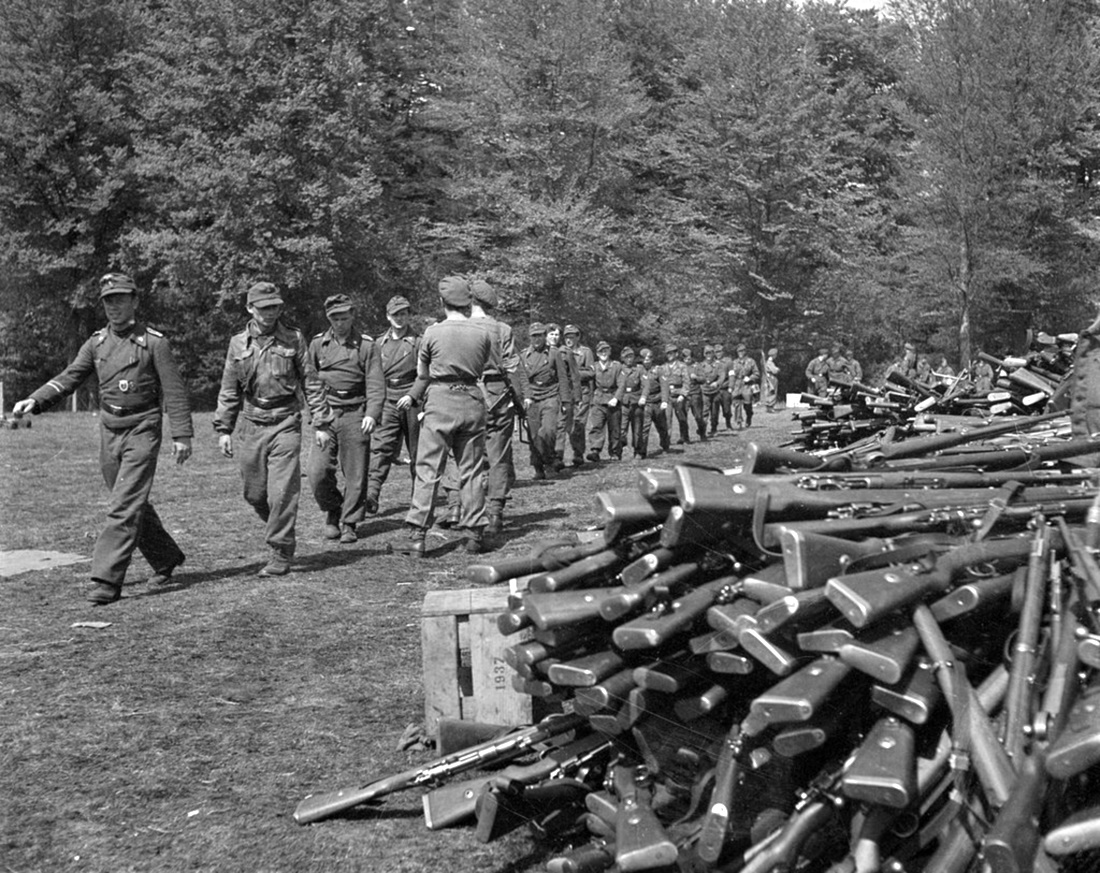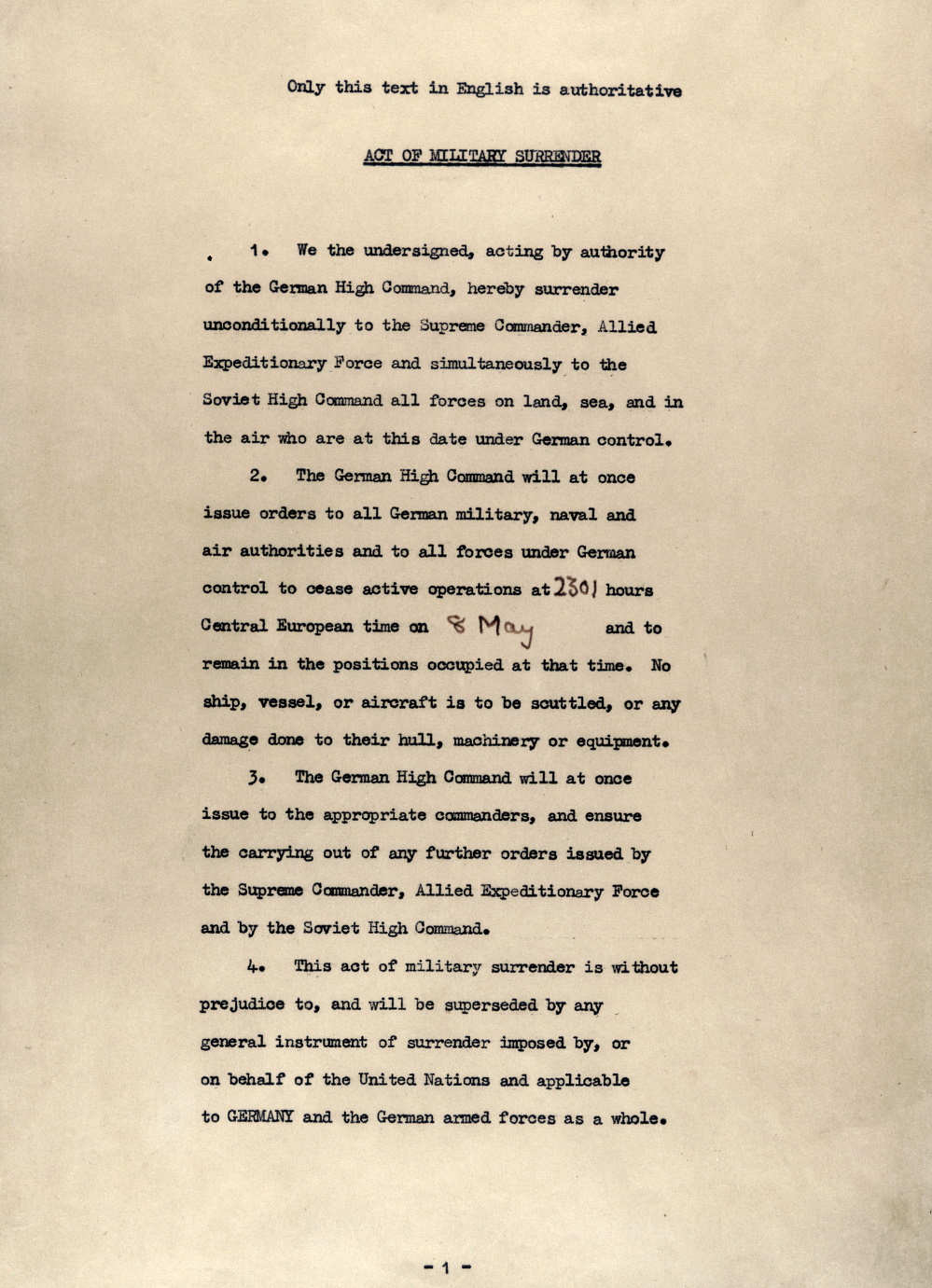To some extent, we retraced our steps and the 563rd Field Artillery Battalion was eventually assigned to Waltershausen, near Eisenach where we had a lively battle with the SS troops. Waltershausen was a nice town not too damaged by the war. It had been known for its doll-making, not industry, which might explain why war damage was slight. Our ‘barracks’, which I may have confused with the one in Reinsdorf, were located next to the railroad station near the edge of town. I think it was here that I had my first encounter with displaced persons, or DPs as they were called.
They were located in enclosed camps near the factory or fields where they worked. These camps were not concentration or termination camps in the Nazi mode but were filled with forced, that is slave laborers from conquered territories, mostly from Ukraine, Poland, and Russia. They were men, women, and children of all ages. The camps were, in some respects, similar to our own camps for Japanese-Americans in the west with the only mitigating difference for this shameful act in our history being that our ill-treated citizens were not forced to work. While not, in most cases, purposely maltreated by the German civilians they worked for, they suffered greatly, particularly as the war drew to a close and food became scarce. It was to take, in most cases, months after the war’s end before these unfortunate people could be transported back to their homes. In the meantime, most remained in their now open camps and subsisted on the food they scrounged from the landscape or were eventually supplied by the Allies. Some, however, took to the road in caravans, which didn’t help the logistical problems facing the Allied Forces.
Even so, they were a happy group, at least the people in the camp outside of the town we were quartered. Often, during the day, using a commandeered flatbed truck, they would come racing through town playing their balalaikas, singing loudly, and dancing in the famous Russian style of crouching and lifting each foot alternatively in time with the music. How they stayed on the truck I’ll never understand.
One night a few of us visited their camp. It was probably forbidden but we didn’t give a damn, after all, they weren’t the former enemy. Of course, we brought some goodies with us. Around a large bonfire, they were dancing and singing and I met a sweet young girl named Tina who was from Kyiv in Ukraine. She was cute, a bit short, and built solidly in more ways than one. We couldn’t communicate orally a bit but just had a lot of fun together like two kids, dancing, singing, and stealing an occasional kiss.
Somewhere I think I still have her picture. I like to think that she will also have a pleasant memory of that innocent night.
As the war was reaching its end in Europe, General Eisenhower issued his famous fraternization ban of American and Allied forces with the enemy, present or former. While the political and psychological reasoning for such an act is understandable, as was soon proved it was a naive and unenforceable fiat, which ran against the course of human nature. A good example is a personal experience I had in Waltershausen.
One of our guard posts was at the railroad station, about 100 yards from the station, just off the tracks, was a small cubiclelike office where a clerk was stationed to record freight movements of some sort. The clerk happened to be a very attractive young woman and, of course, the soldiers on guard frequently gravitated to this spot but they couldn’t get even a nod. This was the time when my high school German really paid off. I can’t remember her name but believe I have it somewhere on a picture.
She responded to my limited German and after a few such tours of guard duty, she suggested that when she got off work in the afternoon that I follow her, but not too closely, to find where she lived and then return when the curfew was on and she would let me in for a ‘visit’. As part of our terrifying and draconian post-war rule (?), all German civilians were under a 1900 to 0600 curfew during which time they were forbidden to be on the streets (the curfew also applied to us).
I did as instructed and she started walking down the main street with me a discrete 50 to 100 yards behind. All went well until she turned off the main street into a residential area full of what we would describe as row houses. As she turned down the street where her home was located, she, unfortunately, stepped through her doorway before I could get an exact fix on which one it was, they were all so similar. This presented a problem but my rigid military training and youthful need for female companionship would overcome all obstacles.
Just before the curfew, I strolled down the main street, more carefully as 1900 witching hour approached. Then I cut over to her street but there was no indication, which was her house. As I said the houses were in a row and in the rear, each house had its own, fenced-in, garden space. There was a walkway or alley there, which separated the area from a duplicate row of gardens and houses. This was repeated throughout the whole neighborhood. As I walked down the alley in full uniform, of course, and with my carbine, many people were working in their gardens. As I approached the approximate area where I figured she must live, a rather old woman (it turned out to be her grandmother) was working in her garden and nodded to me that this was the place but told me not to come in until all her neighbors were in their homes.
 It was now past the curfew and it soon became obvious that the local people were not going to go indoors without some persuasion. I shouted at them in English and German and waved my gun at them but they weren’t fooled. They knew what was up.
It was now past the curfew and it soon became obvious that the local people were not going to go indoors without some persuasion. I shouted at them in English and German and waved my gun at them but they weren’t fooled. They knew what was up.
Then, suddenly and scaring the hell out of me, a military police patrol jeep with an officer in it drove rapidly by an intersection of our alley with another about 50 or 100 yards away. You could hear the jeep come to a screeching halt and turn around. With that, Grandma opened the garden gate and rushed me in the rear door. At the same, all the Germans rapidly disappeared into their homes. That jeep must have circled the area for hours before giving up in frustration and I enjoyed every minute of it. Of course, when returning to my quarters late at night, I was very careful feeling like a crook as I sneaked from doorway to doorway.
Now you might think I am about to describe a scene of lust and, honestly, I wouldn’t have necessarily resisted such an outcome but that’s not what happened. At first, I was a little uncomfortable in a German home with my carbine slung on a coat hook and her father’s picture as a Luftwaffe Colonel proudly displayed on the mantle. But we quickly entered into a most interesting if puzzling dialogue. It was said, and not without irony, that there were no Nazis in Germany – at least when we got there.
As we started to get acquainted I asked her how she and others like her father could have supported a beast-like Hitler. To my surprise, she did not deny her feelings and listed the many great things she thought Hitler has done for Germany after the great depression following their defeat in World War One. She listed the events we are all familiar with, e.g., ending unemployment, providing new hope and direction for the German people, regaining lost provinces and territory, building new schools, the autobahn, etc., etc., and had rejected as propaganda all the terrible things said about him.
As I recounted the evil and terrible things the Nazis had done under the leadership of Hitler, she was clearly taken back and unbelieving but when describing what I had actually seen at Ohrdruf she was clearly shaken to the core. We continued our conversations over several visits, accompanied with what we called necking in my day but she neither encouraged nor did I press for anything further which, in retrospect, I am very proud of. It is comforting to think that I helped her begin to understand and accept what had actually happened and that we both took giant steps in learning how to move on in peace and strive for a better world for all mankind. I hope she fared well.
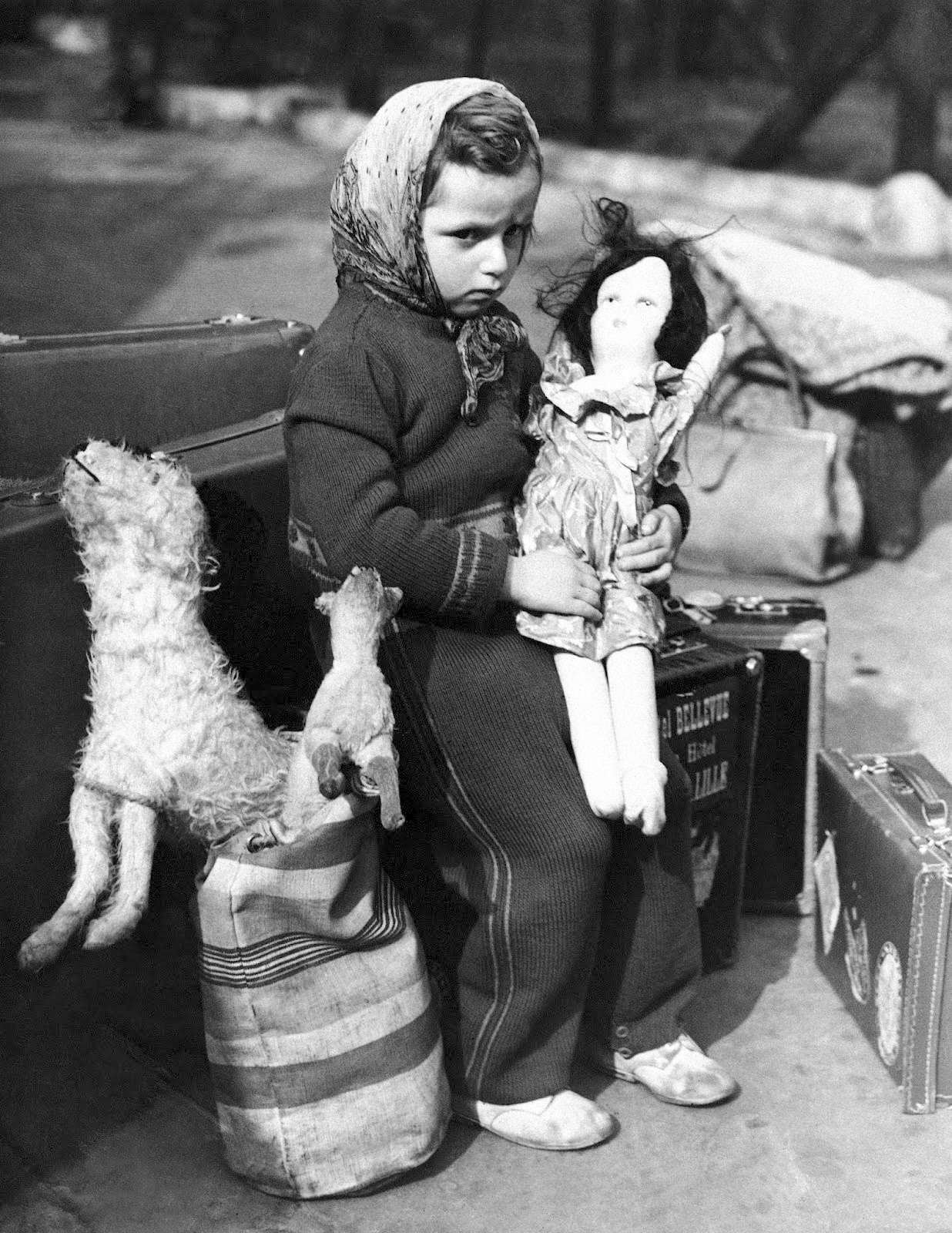 The story of my occupation duty and Waltershausen ends, appropriately, with a doll. The day we were to leave for France, our trucks and cannons were lined up in the road next to the railroad station waiting, as usual, for the word to move out. Suddenly, from her little office cubicle, she emerged and walked towards my truck with the whole Battery looking on. She had a doll in her hand, which she presented to me as she kissed me goodbye. The troops went wild and, for the moment at least, I was the most envied soldier around. I am happy to conclude with the observation that no officer made any inquiry. The doll is long-gone, I think I gave it to my mother, but not the memory.
The story of my occupation duty and Waltershausen ends, appropriately, with a doll. The day we were to leave for France, our trucks and cannons were lined up in the road next to the railroad station waiting, as usual, for the word to move out. Suddenly, from her little office cubicle, she emerged and walked towards my truck with the whole Battery looking on. She had a doll in her hand, which she presented to me as she kissed me goodbye. The troops went wild and, for the moment at least, I was the most envied soldier around. I am happy to conclude with the observation that no officer made any inquiry. The doll is long-gone, I think I gave it to my mother, but not the memory.
BACK TO FRANCE
By train and truck, back we went to where we started, Normandy France. The grand concept was, I believe, to have the 89th run or at least start up the old cigarette camps which would process the freed up divisions to return to the States, provide their soldiers with 30 days leave while the outfit was refitted, and then send them on to the Pacific Theater as reorganized divisions or as individual replacements. At first, we believed the 89th would then follow itself but it turned out that this was not in the High Command’s plans while this information was withheld from the troops to prevent demoralizing them, or some screwy idea like that. The 563rd, or at least my Battery, ended up in one of the smaller camps near Rouen (I think it was Camp Old Gold) and close to our old ‘friend’, Camp Lucky Strike. I didn’t realize it at the time, but this marked the beginning of some good and memorable times for me.
Not long after we settled in, one morning I picked up the latest Stars and Stripes newspaper, and most of the front page was filled with a drawing of what appeared to be a large and puzzling mushroom. This accompanied the startling news of the original atomic bomb being dropped on Japan, the first knowledge any of us ever had about such a miraculous weapon and our first inking that World War II might soon be over. Welcome as the news was, most of us could not make ourselves believe it. After all, ‘Golden Gate in 48’ had been our motto and hope for so long.
I don’t remember having much to do in Old Gold. I might have been working in our camp PX, but in a short while, I get very sick with a chest cold and high fever. I stayed in the sack in my tent for several days and asked our cook to supply me with my mother’s favorite treatment for the grippe, a mustard plaster application. It never failed in the past but it did this time. Finally, a medical officer came to see me and diagnosed me, correctly, as having pneumonia. It turned out to be atypical pneumonia, whatever that meant. I was immediately transported to the Army Hospital in Rouen, located in an old but spacious French hospital building but completely staffed by Americans. Penicillin was in scarce supply in those days and the usual treatment was some sulfa concoction (sulfamethoxazole my MD son-in-law tells me). It was a slow process and, as I improved with treatment, not an unpleasant process as the nurses and others were very kind and occasionally took us outdoors on little outings, but in two weeks or so, I was ready to go back to my outfit. Upon return, I received a very pleasant surprise. I was given an R&R (rest and recreation) furlough of seven days in Nice. I sold my watch and every carton of cigarettes I could buy at the PX to get some spending money for the trip.
Soon, about four of us were on our way. We boarded a civilian train for Paris with Army tickets and our adventure began. A conductor came down the aisle announcing that lunch was being served in the dining car. I guess we had been told not to eat in non-military places but, ever the pusher of boundaries, I asked him if we could eat there. He replied ‘Mais oui, Moussier’ and personally escorted us to the car and seated us, making us feel very good. The lunch was great, at least for us, and we started off on a high note, little realizing that tomorrow would be the day of the century. When we arrived in Paris, we were assigned to an Army billet for transients and scheduled to leave for Nice in the morning. The next day the Japanese surrender was announced, it was VJ day and Paris, like other cities in the free world, went mad. What a place to be on this momentous day!!!
That night we went to a huge dance hall that was regularly used for GI entertainment. It was filled to the gills with hilariously happy GIs and their French friends, mostly female of course. While the food was available, cases of champagne were constantly being delivered; in some cases donated by grateful Frenchmen, I’m sure. Dancing was almost impossible and just an excuse to hold and kiss a girl, and the noise was almost ear-splitting. I would be happy to describe this unique experience in more detail but, for some reason, I can’t seem to remember the details.
After very little sleep, somehow we dragged ourselves out of bed and went down to the train station the next day (I think but wouldn’t swear on it) for our transportation to Nice and, ah, what a beautiful sight that was for our sore eyes. This time I have to give the Army credit. They really did it right. Upon arrival, we were given hot showers and new clothing and then off to one of the plush pre war hotels taken over temporarily for us. We were assigned to the Negresco, a famous old and stately hotel right on the beach. All the hotels maintained their own staff, including chefs, but the Army supplied the food, and oh, what the French could do with it as we soon learned to our delight and which made me a lover of French food and wine for life. There was, of course, no charge for room and meals. However, there was also a plentiful supply of bars, cafes, bistros, and the like. Both as a guide for GIs and to prevent them from being exploited, all such establishments were placed in one of four categories with prices controlled accordingly. This was very helpful.
 Besides enjoying the beach and sightseeing, I had two memorable and pleasant experiences there. My high school buddy was a Christian Scientist and I had become interested in their teachings (the old slogan that there were no atheists in the war was pretty accurate). While in Nice, I visited a Christian Science practitioner and after a pleasant and helpful talk, she invited me to join her on a bus trip to Grasse (famous for its perfumes) up in the mountains with a glorious view of the Riviera. She also mentioned bringing along a young lady for my company, which seemed fine to me.
Besides enjoying the beach and sightseeing, I had two memorable and pleasant experiences there. My high school buddy was a Christian Scientist and I had become interested in their teachings (the old slogan that there were no atheists in the war was pretty accurate). While in Nice, I visited a Christian Science practitioner and after a pleasant and helpful talk, she invited me to join her on a bus trip to Grasse (famous for its perfumes) up in the mountains with a glorious view of the Riviera. She also mentioned bringing along a young lady for my company, which seemed fine to me.
Away we went the next day and the Mademoiselle was indeed very attractive, young and graciously. How did I get so lucky? After a perilous but beautiful bus ride, we reached our destination, a cafe with an outdoor patio overlooking the Mediterranean Sea. Madame had brought some sandwiches in a bag for lunch and ordered some soft drinks. Out came several fresh tomato sandwiches, a gracious gesture as tomatoes were in very short supply and only available on the expensive black market. Unfortunately for me, I simply can’t eat raw tomatoes – never could and still, to my wife’s consternation, never will. But, of course, I couldn’t refuse to accept her gift. So with a smile on my face and a groan in my gut, I ate a sandwich smiling all the way. She was so pleased that she insisted I have another one. What can you do?
(Reminds me of many years later when I was a Foreign Service Officer in Jordan, as a guest of honor at a Sheik’s feast in the desert I was obliged to eat the eyes of a camel whose meat we were eating. I got through that ordeal by envisioning the American flag being run up a flagpole).
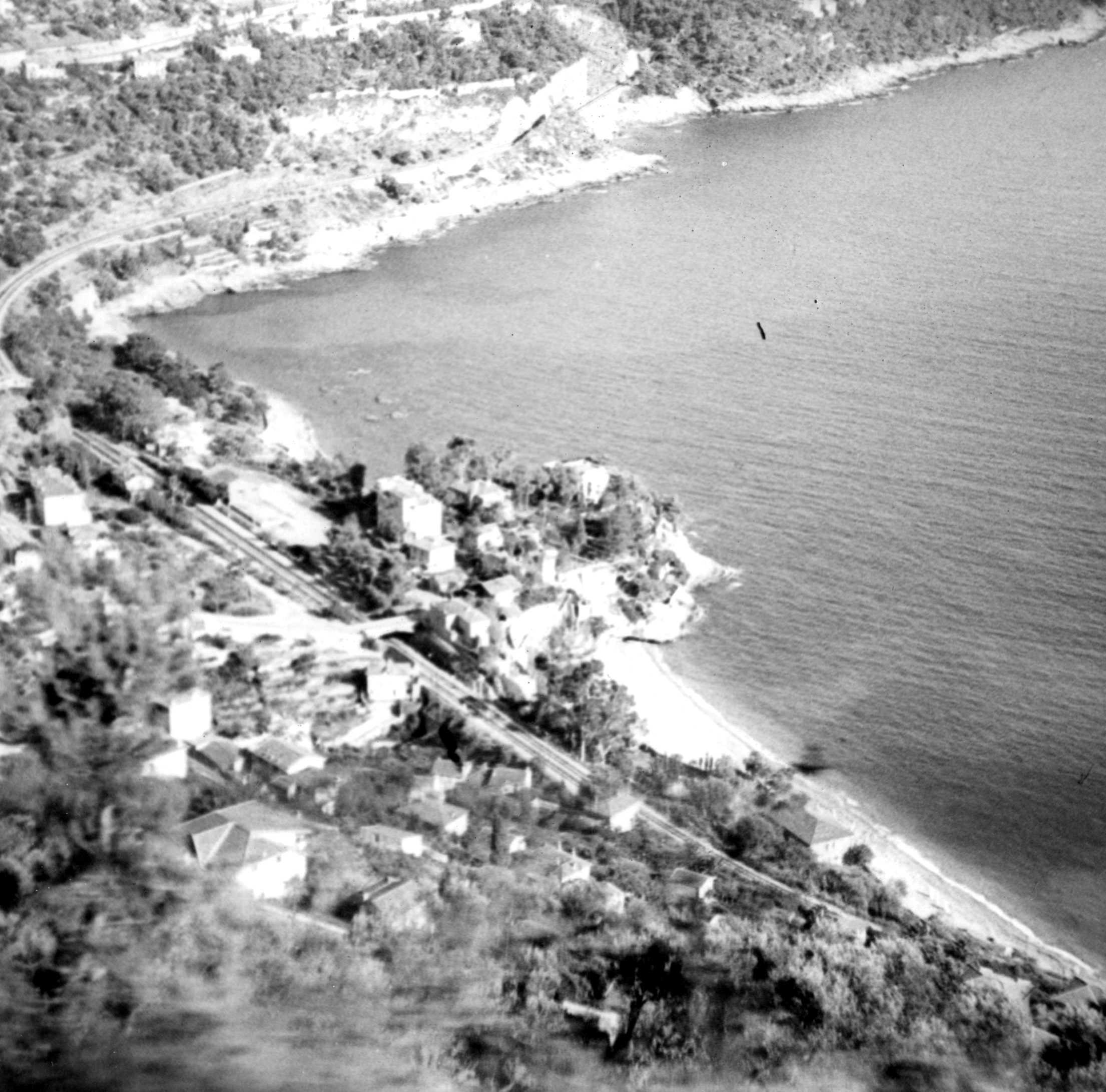 Well, good deeds sometimes pay off. I asked the young lady out the next night but was careful where we went because my finances were very limited. We danced a bit and enjoyed ourselves. She mentioned having a friend who was dating a Sergeant who worked in a ritzy hotel with a great band up on a hill over the city. She suggested we go there with her girlfriend to dance while waiting for her boyfriend until he got off duty when the outdoor dance floor closed down and the soldiers and others departed. It was one of the most romantic evenings of my life.
Well, good deeds sometimes pay off. I asked the young lady out the next night but was careful where we went because my finances were very limited. We danced a bit and enjoyed ourselves. She mentioned having a friend who was dating a Sergeant who worked in a ritzy hotel with a great band up on a hill over the city. She suggested we go there with her girlfriend to dance while waiting for her boyfriend until he got off duty when the outdoor dance floor closed down and the soldiers and others departed. It was one of the most romantic evenings of my life.
The orchestra and patrons left and the lights went out. The dance floor, however, was flooded with the light of a full moon and we are completely alone. I invited her to continue dancing and sang softly into her ear, primarily to provide us with some rhythm and it worked superbly. I had a pretty good voice in those days. When it was time to go, I escorted them both to the place they were living. We sat on the stairs and talked and kissed occasionally until almost sunrise. I never saw or heard from her again, but it is still a sweet, lovely, and innocent memory. She wrote on a picture she gave me ‘To my American friend’. Nice.
ROUEN
Soon after I got back to camp, the 563rd was sent to Rouen to act as military police in the city. What a ball. We patrolled the streets and sometimes guarded so-called strategic sites like major gas lines. As combat GIs and not real MPs, we also provided ‘unauthorized’ taxi service for soldiers too drunk to walk back to their trucks for return to their camp. We were comfortably billeted in a fair-sized building with our own mess hall. Early on, I believe it was at a street celebration for Bastille Day or something similar, I met a French family in the crowd watching the fireworks and struck up a conversation with the father and, of course, an attractive daughter. They kindly invited me to their home for coffee when it was over. They were a middle-class, educated family and it was very interesting to hear their perspective on the war. Of course, the citizens of Rouen, like all French people, were grateful for the role we had taken in liberating their country from the 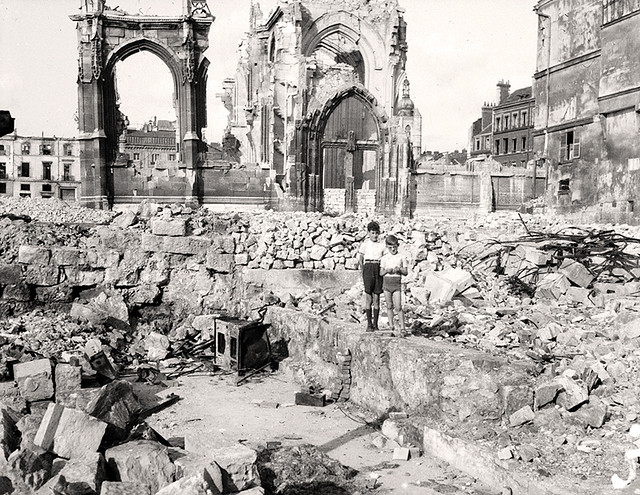 Germans but the citizenry had suffered terribly in both the invasion and liberation of France.
Germans but the citizenry had suffered terribly in both the invasion and liberation of France.
Rouen, for example, located on the Seine River and a major transportation artery and port, had been heavily bombed in preparation for the invasion. The allied bombers were aiming at the wharves and ships docked there but unfortunately, a great many of our bombs wiped out almost the entire northern bank up to and severely damaged its famous cathedral near the center of the city. It was one vast wasteland (Fifty-four years later, when I returned to Rouen with my son and saw the size of the area where restoration had long ago been completed, I couldn’t believe its magnitude because now I could only see cathedral spires.) My French host was trying delicately to explain why many people in Rouen were unhappy or even bitter about the Allies. I am certain he was correct but I never encountered any animosity personally.
Most of the time I patrolled the streets in the daytime, which was easy work, although sometimes a bit more challenging in the evening. It was easy to meet and chat with the pretty girls walking but, unless you spoke French, not so easy to follow upon. In a bar/cafe we frequented, I did make an interesting female acquaintance. She was a very pretty blonde woman who hung out with a girlfriend in the bar as a prostitute. We often chatted with them and she explained that she had a child and her husband had been killed in the war. Sometimes I would give her some candy and food for the child and cigarettes for her to sell. She felt obligated to explain that she and her friend wanted to buy a village cafe they had their eye on outside Rouen and would quit what they were doing as soon as they had accumulated enough money.
 One day when we stopped by, she and her friend were gone—they had obviously achieved their goal.
One day when we stopped by, she and her friend were gone—they had obviously achieved their goal.
I thought that was the last I would see of Jacqueline. However, a few weeks later as I was on street patrol in town, there she was sprightly walking with her full shopping basket. We talked and she was radiant in her happiness. She invited me to come to visit her and see her new place. It was located at least 20 km out of town off the main road and would be a difficult journey but I promised to try and get out there as soon as I had some free time.
I soon found the time, but on a Saturday when there was no bus transportation and little local travel because of the gas shortages. I easily caught a ride out of Rouen to the intersection with the road going to her town but not a single vehicle came along it and I must have walked at least 10 miles to reach it. They had a lovely little country cafe and I see why they would love it. After a welcoming drink, I could see they were busy and I was bushed so she took me up to her room to rest and I promptly fell asleep. As I awoke in the early afternoon, there she was looking fondly at me as she undressed, climbed into bed beside me, and showed me her appreciation in the best way she knew.
I am sure she went on to a happy, prosperous and normal life.
Hey, we all have to do tough things in perilous times.
August 31, 2000
Written at age 76
Pfc Raymond E. Kitchell
563rd Field Artillery Battalion
89th Infantry Division
Additional Info & Images
camprobertshistoricalmuseum.com
draft-realm.com
nc.ng.mil
hippostcard.com
cmstory.org
nara.getarchive.net
ibiblio.org
44thcollectorsavenue.com
nationalww2museum.org
histoire-fanatique.tumblr.com
vintag.es
thumbs.worthpoint.com











